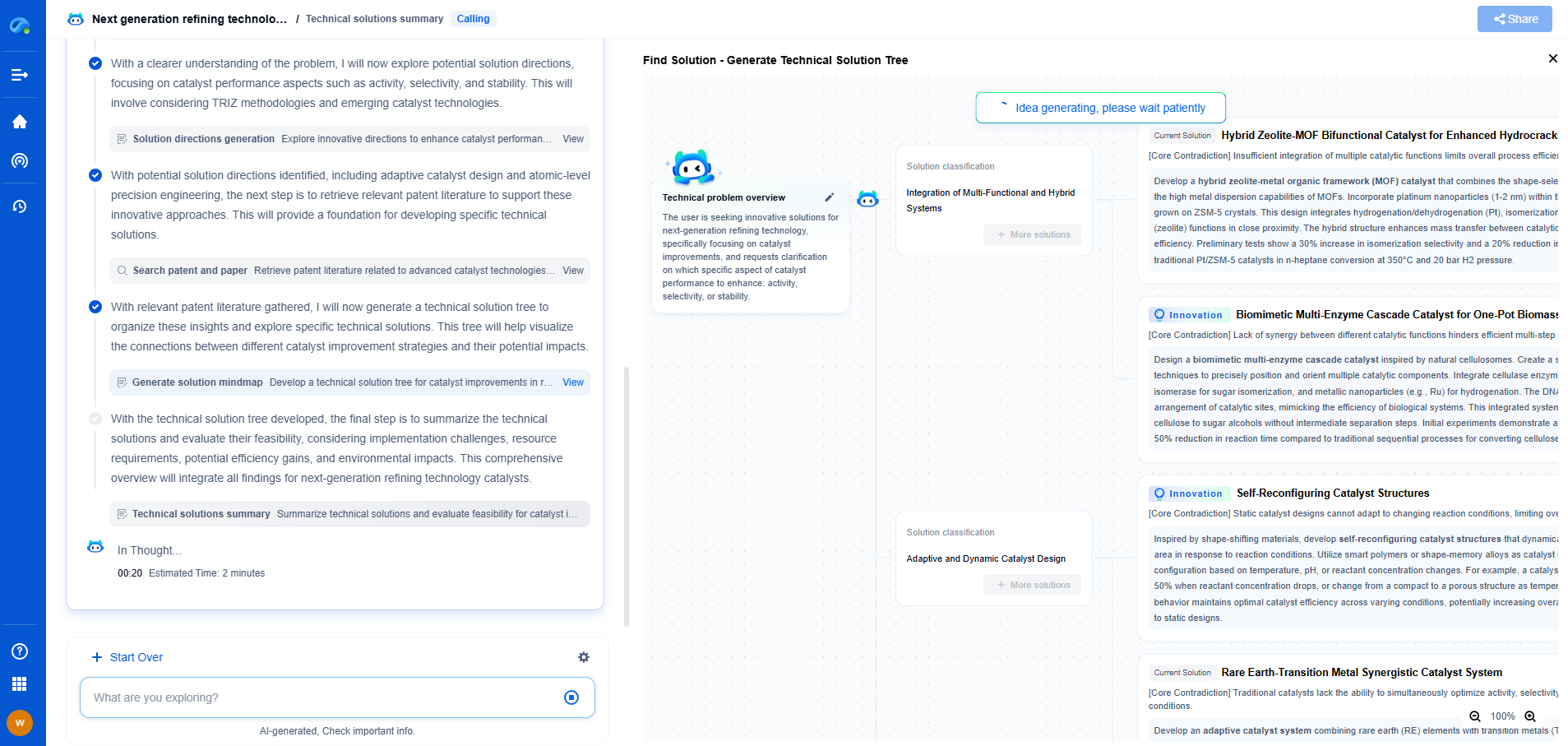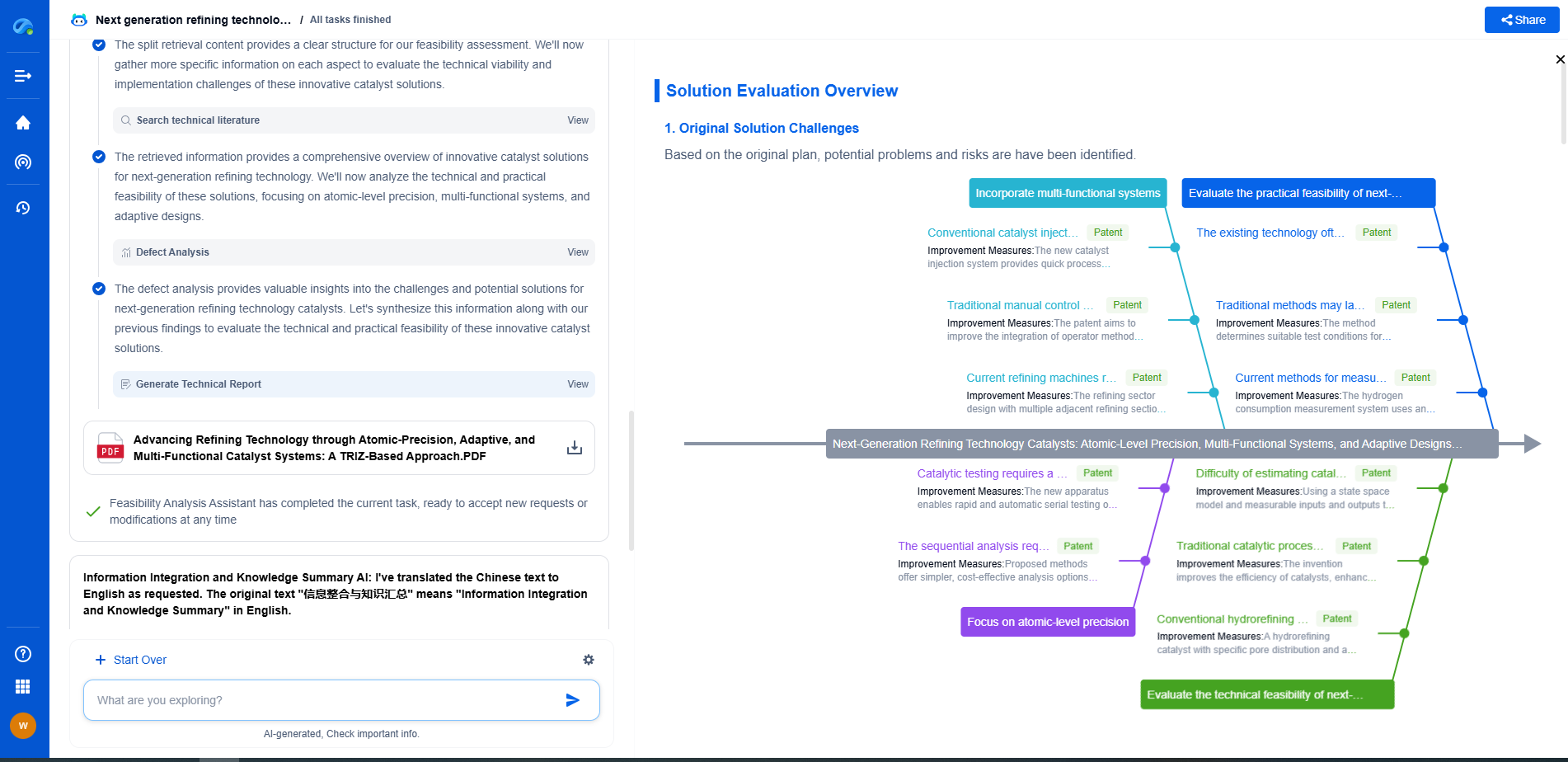Zero-Boil-Off (ZBO) Liquid Hydrogen Tank Technologies
JUL 21, 2025 |
In the pursuit of advancing space exploration and hydrogen energy applications, the efficient storage and management of cryogenic propellants like liquid hydrogen have emerged as critical challenges. Among these, boil-off loss is a significant concern, leading to wasted resources and reduced performance. Zero-Boil-Off (ZBO) liquid hydrogen tank technologies offer innovative solutions aimed at virtually eliminating these losses and enhancing the sustainability of hydrogen storage.
Understanding Boil-Off in Liquid Hydrogen Tanks
Boil-off refers to the vaporization of liquid hydrogen due to heat transfer from the environment into the storage tank. This process results in a gradual loss of the stored cryogenic liquid as it transitions into a gaseous state, causing pressure build-up and necessitating venting to maintain tank integrity. For long-duration missions and storage needs, such as those typical in space missions and hydrogen fuel applications, minimizing boil-off is essential to ensure efficiency and cost-effectiveness.
ZBO Technologies: A Closer Look
ZBO technologies are engineered to address the heat transfer issues that lead to boil-off. These systems integrate advanced insulation, cryocoolers, and thermal management techniques to maintain the cryogenic temperature of liquid hydrogen, thereby preventing it from reaching its boiling point. The goal of ZBO systems is to achieve a thermal balance where the heat entering the tank is equal to the heat removed, resulting in zero net boil-off of the liquid hydrogen.
Advanced Insulation Methods
One of the primary strategies employed in ZBO technologies is the use of advanced insulation materials. Multilayer insulation (MLI), spray-on foam insulation (SOFI), and vacuum-jacketed systems are among the most effective insulation techniques. These materials work by minimizing conductive, convective, and radiative heat transfer, thereby reducing the thermal load on the liquid hydrogen tank. By improving insulation, these systems significantly reduce the rate at which external heat infiltrates the storage vessel.
Integration of Cryocoolers
Cryocoolers play a pivotal role in ZBO technologies by actively removing heat from the storage system. These refrigeration devices are designed to counteract the heat ingress by maintaining the low temperatures necessary to keep hydrogen in its liquid state. Various types of cryocoolers, including Stirling, pulse-tube, and turbo-Brayton coolers, are integrated into ZBO systems based on specific application requirements. Their operation ensures that any residual heat that penetrates the insulation is efficiently extracted.
Thermal Management Techniques
Thermal management within ZBO systems is further enhanced through innovative design strategies. Techniques such as tank geometry optimization, the use of reflective coatings, and the implementation of active cooling loops contribute to reducing heat influx. Moreover, thermal shields and barriers strategically placed within the system act as additional layers of defense against heat penetration. These measures collectively improve the thermal efficiency of the storage tank.
Applications and Benefits of ZBO Technologies
The implementation of ZBO liquid hydrogen tank technologies is transformative for various sectors. In space exploration, they are crucial for long-duration missions where cryogenic propellant conservation is vital. By minimizing boil-off, ZBO systems extend mission durations, reduce launch mass, and enhance overall mission feasibility. In the hydrogen energy sector, ZBO technologies contribute to more efficient fuel storage and transport, thereby supporting the broader adoption of hydrogen as a clean energy source.
Conclusion
Zero-Boil-Off liquid hydrogen tank technologies represent a significant advancement in cryogenic storage, addressing the challenges associated with boil-off losses. Through a combination of advanced insulation, cryocoolers, and sophisticated thermal management techniques, ZBO systems ensure the sustainable and efficient storage of liquid hydrogen. As the demand for hydrogen in both space exploration and clean energy continues to grow, the development and deployment of ZBO technologies will be instrumental in shaping a sustainable future.
As clean energy and decarbonization drive new breakthroughs in hydrogen storage, CO₂ transport, and alternative gas carriers, keeping pace with technical trends and patent activity is critical to staying competitive.
Patsnap Eureka helps innovators in compressed gas storage, high-pressure tank design, gas sensor systems, and pipeline materials accelerate research by offering instant, AI-powered insights into global patents, related technologies, and emerging white spaces.
🚀 Bring speed, precision, and strategic foresight to your innovation and IP decision-making in the gas transport sector—try Eureka today and unlock a smarter path forward.
- R&D
- Intellectual Property
- Life Sciences
- Materials
- Tech Scout
- Unparalleled Data Quality
- Higher Quality Content
- 60% Fewer Hallucinations
Browse by: Latest US Patents, China's latest patents, Technical Efficacy Thesaurus, Application Domain, Technology Topic, Popular Technical Reports.
© 2025 PatSnap. All rights reserved.Legal|Privacy policy|Modern Slavery Act Transparency Statement|Sitemap|About US| Contact US: help@patsnap.com

